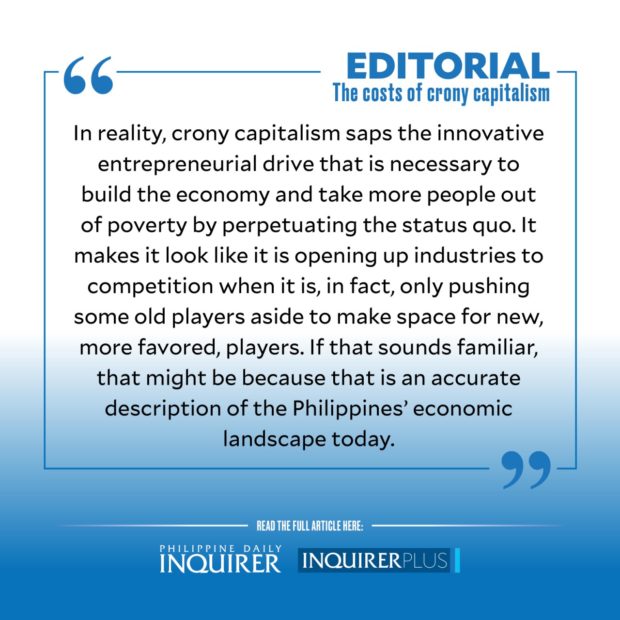The costs of crony capitalism
That crony capitalism exists in the Philippines cannot be denied. One simply needs to compare the prices the average Filipino has to pay for basic products and services compared to what citizens of other comparable countries pay to realize that something is wrong with the local system.
Defined as an economic system characterized by close, mutually advantageous relationships between business leaders and government officials, crony capitalism has been present in local society in one form or another since before the founding of the country as an independent state.
Article continues after this advertisementBut to hear it from external, third parties confirming that Filipinos continue to live under a rent-seeking structure to the extent of being a world leader in it in this day and age, when administration after administration wins on the promise of leveling the playing field for everyone, is truly sobering.
Last month, The Economist released its latest crony-capitalism index which ranked the Philippines fourth in the world when it comes to the amount of wealth held by billionaires as a percentage of the country’s total economic output.
The Philippines—with almost 10 percent of 2021 gross domestic product coming from its billionaires and their businesses—was surpassed only by Russia, Malaysia, and Singapore, and just narrowly edged out Ukraine in the rankings.
Article continues after this advertisementThis year’s ranking is actually an improvement from the previous edition of the list in 2016 where the country was at third spot. But the level remains unacceptable given government’s stated goal of improving the economic lot of Filipinos.
The problem with crony capitalism is that, on the surface, it looks like things are getting done for the benefit of the population.
On the surface, it looks like massive infrastructure projects are getting built. It looks like new telecommunications companies are being put up to provide the people with cheaper access to the internet. It can even look like utilities are being wrested away from old oligarchs and handed over to other businessmen who can run them better.
But what is ostensibly good about it stops there.
In reality, crony capitalism saps the innovative entrepreneurial drive that is necessary to build the economy and take more people out of poverty by perpetuating the status quo.
In reality, crony capitalism seeks to have a few key businessmen enjoy the spoils of a rent-seeking system while making it look like the government is looking out for its citizens. It makes it look like it is opening up industries to competition when it is, in fact, only pushing some old players aside to make space for new, more favored, players.
If that sounds familiar, that might be because that is an accurate description of the Philippines’ economic landscape today.
For Filipinos’ economic lives to improve by a significant measure, the playing field has to be leveled to give equal opportunities to business sector players whether they are small entrepreneurs or large conglomerates.
It has to be just as easy for foreign investors to set up shop in the country to compete toe to toe with Filipino enterprises (some progress has been made in amending laws that previously prevented this, but it remains to be seen how these laws will be executed).
The last time the country saw any meaningful progress in cutting the tentacles of crony capitalism that were squeezing the lifeblood out of many lucrative sectors of the Philippine economy was during the presidency of Fidel Ramos. But this momentum was stalled by the 1997 East Asian financial crisis and the Philippines quickly regressed to its default policy of cozy relationships between the billionaires and government officials to move the country forward.
Make no mistake about it: This system works in providing Filipinos with the progress they need. But it does so at inflated prices, no thanks to the inefficient structures that protect the crony capitalists and their rent-seeking interests.
For genuine progress to be made, the next administration has to double down on structural reform initiatives that will put nimble new businesses on equal footing with long established giants.
That will require our policymakers to put the interests of everyday Filipinos ahead of their own lucrative ties with the existing captains of industry.
The alternative to this is a citizenry that will continue to suffer under expensive utilities and basic goods, and poor service. Worst, surplus resources from Filipino consumers will continue to subsidize the already fat billionaires instead of being used more efficiently in economy-building undertakings—the textbook definition of rent-seeking behavior.

















